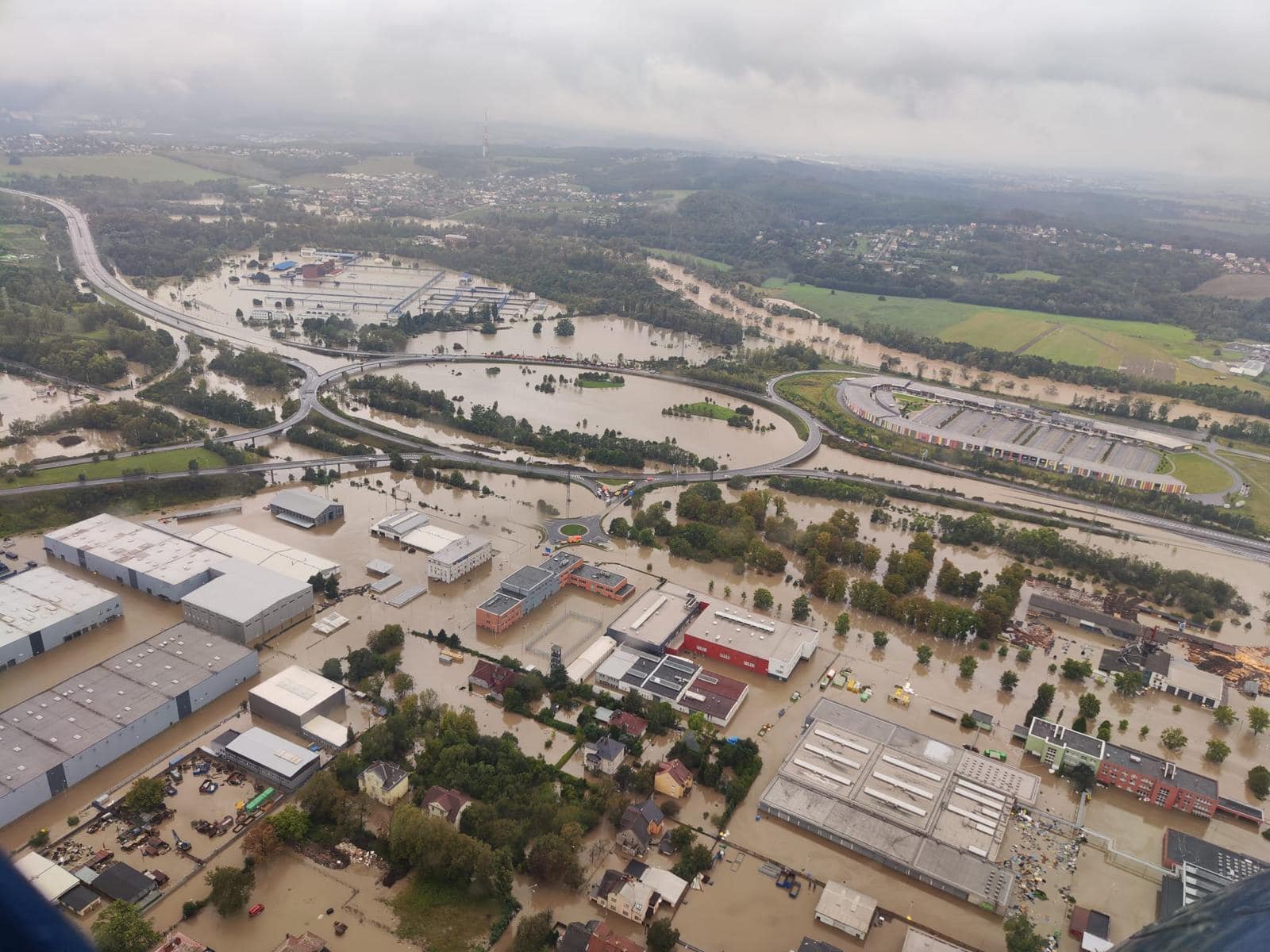What we’re watching: Weekly disaster update, September 16

We know all too well that disaster can strike anytime, anywhere in the world. Some disasters make headlines; others do not. Here at the Center for Disaster Philanthropy (CDP), we monitor the status of disasters worldwide and compile a list of the ones we’re tracking weekly, along with relevant disaster-related media coverage.
Here’s what we’re watching for the week of Sept. 16, 2024.
New or Emerging Disasters
Flooding – Nigeria: More than one million people have been affected in Maiduguri, the capital and biggest city in Borno State, Nigeria, by floods on Sept. 10. At least 200,000 people were displaced after the Alau Dam burst, flooding at least 70% of the city.
BBC said, “There are worries about an outbreak of waterborne diseases as most of the city’s network of sewers has collapsed, contaminating water sources.”
The number of deceased is not yet known as the flood occurred at night while people were sleeping, and not all homes have been searched. Punch newspaper cited statistics from the National Emergency Management Agency, “recent floods have damaged approximately 16,488 hectares of farmland across 27 states; destroyed 32,000 houses, and impacted no less than 227,000 people.”
Storm Boris – Central and Eastern Europe: Communities in several countries in Eastern Europe, including Austria, the Czech Republic, Hungary, Poland, Romania and Slovakia, are flooding following heavy rains from Storm Boris. Thousands of people have been evacuated; at least eight are dead and several are missing. Storm Boris dropped a month’s worth of rain in 24 hours, beginning Sept. 13. A dam in the Czech Republic burst its banks, flooding several communities downstream. The country received three months of rain in three days.
Drought – Brazil: The worst Brazilian drought in seven decades has led to dry rivers, wildfires and poor air quality. It has disrupted trade and travel, caused the loss of jobs, and slowed commerce in multiple countries. Almost 1.9 million square miles (59% of the country) have been affected. This is the first time a drought has covered the country.
The Paraguay River is a vital transportation route running 2,110 miles from Brazil through Bolivia, Paraguay, Argentina and Uruguay. Because of the drought, at least half of the river’s capacity for shipping is delayed or stopped, and losses are anticipated to be in the hundreds of millions since no rain is expected.
Wildfires – South America: As of Sept. 11, Brazil’s space agency, Inpe, has recorded 346,112 fire hotspots throughout South America. This is the record for most fires in a single year to date, dating back to 1988, and includes several diverse types of ecosystems. Most of the fires have human causes, but the lack of a true winter, drought and heat waves show a clear connection to the impact of climate change.
Currently, 60% of fires in South America are in Brazil, which was fighting 50,000 wildfires as of Sept. 14. Many cities are dealing with poor air quality due to smoke. NASA has reported seeing the smoke from a satellite a million miles away.
Previous/Ongoing Disasters
Hurricane Francine – Multiple States: Hurricane Francine made landfall between Cocodrie and Morgan City, Louisiana, on Sept. 11 at 5 p.m. CDT as a Category 2 storm. It moved very quickly, preventing feared stalls, but still brought heavy rain and high winds to many communities across southern Louisiana, with rain flooding homes and cars and winds causing roof damage.
Francine dumped 7 inches of rain on an already-soaked New Orleans. Combined with power outages and pump failure, Francine led to extensive flooding throughout the city. New Orleans typically receives five inches of rain in September and has received almost 13 inches so far in the month, with two weeks to go.
Fewer than 10,000 customers were still without power at 6 p.m. CDT on Sept. 15, down from almost 350,000 on Sept. 12. As Francine traveled into Mississippi, Alabama and Tennessee, it weakened but left damage in its wake.
Super Typhoon Yagi – Multiple Countries: Damage and death reports continue to emerge from Super Typhoon Yagi, which hit Southeast Asia in the first two weeks of September.
In Myanmar, the death toll reached 113 on Sept. 15, with 64 people missing. More than 320,000 people have been displaced in the country, adding to the already 3.4 million displaced by war and unrest. A rare request for foreign aid from the junta’s chief was reported by France 24.
In Vietnam, the worst-impacted country, the death toll rose on Sept. 15 to 296 people, while the number of missing fell to just under 30. In Yen Bai Province, floodwaters damaged or destroyed 18,000 homes, leading to the evacuation of almost 60,000 people.
For more information, see CDP’s Super Typhoon Yagi profile.
Extreme Hunger – Multiple Countries
This standing section will update readers on areas facing extreme hunger.
Médecins Sans Frontières (MSF) released a statement on Sept. 9 sharing the results of a screening of 97,000 children conducted in June in North West Nigeria. The statement says that one in four children in the Shinkafi and Zurmi areas of Zamfara are suffering from malnutrition. Of the children screened, 5% had severe acute malnutrition, 27% had acute malnutrition and 22% were moderately malnourished. MSF has raised concerns about child malnutrition rates several times this year, announcing in June it was treating an increased caseload of malnourished children.
CDP resources include:
- Our Global Hunger Crisis Fund supports recovery from hunger and famine worldwide.
- Our Famine Issue Insight explores meanings, statistics and levels of hunger definitions.
- Our Nutrition Issue Insight looks at the impact of the lack of food on a person, as well as food and nutrition needs after disasters.
In addition to the disasters listed above, we actively monitor the following disasters or humanitarian emergencies. For more information, see the relevant disaster profiles, which are updated regularly.
- 2024 North American Wildfires
- 2024 Atlantic Hurricane Season
- 2024 South Asia Floods
- Sudan Humanitarian Crisis
- Horn of Africa Hunger Crisis
- Gaza-Israeli Humanitarian Crisis
Complex Humanitarian Emergencies – Cameroon
Many places worldwide are experiencing emergencies caused by conflict, climate change, drought, famine, economic challenges and other conditions that combine to create a complex humanitarian emergency (CHE). CDP maintains complete profiles on several CHEs, and what CDP considers Level 1 CHEs are profiled in this weekly blog post and tracked.
The situation in Cameroon’s northwest and southwest regions continues to be characterized by the impact of insecurity and violence. Separatists fighting for the creation of an English-speaking state separate from the majority French-speaking Cameroon have been waging a war with the government since 2017. Rights groups say the government is not doing enough to protect civilians.
Non-state armed groups also target civilians as fighting persists in the Lake Chad Basin area in northern Cameroon. Additionally, the arrival of refugees from the neighboring Central African Republic strains existing resources. The combined impact of these three crises and the high levels of unaddressed need led the Norwegian Refugee Council to place Cameroon second on their 2023 list of the most neglected displacement crises.
According to the Famine Early Warning Systems Network, crisis levels of acute food insecurity will persist in the country’s north. While the main harvest in the northwest and southwest regions is expected to temporarily improve food access in some areas, crisis levels are expected there as well from October 2024 to January 2025.
In addition to violence and insecurity, Cameroon also encounters various natural hazards. In September, heavy rainfall resulted in flooding in the country’s north, with more than 200,000 affected and around 12,500 homes damaged. As of Sept. 2, donors had funded just 36% of the 2024 Humanitarian Response Plan.
What We’re Reading
- Climate mobility and childhood – UNICEF: A report from the International Data Alliance for Children on the Move examines how climate mobility influences the well-being of children, addressing information policymakers need, availability of data and how to respond to climate change.
- Two years after deadly floods hit Pakistan, it’s happening again – The New York Times: “Environmental groups have criticized the government for what they called delayed and insufficient relief efforts; substandard infrastructure, especially in rural areas unprepared for large-scale disasters; and pervasive issues of corruption, mismanagement and lack of coordination among agencies.” See also: Pakistan hasn’t learned lessons from 2022 deadly floods, experts say – Associated Press
- Bangkok turns to urban forests to beat worsening floods – Mongabay: “Bangkok is launching city forests to help beat flooding by soaking up excess rainwater runoff. A new park slated to open in December will feature 4,500 trees, a floodplain and a weir to slow the flow of water; another newly opened $20 million city forest acts as a sponge during the monsoon season … The key to solving the city’s flooding problem is to learn to live with water, not to rid the city of water, says one landscape architect helping to launch the urban forests.”
- A robot begins removal of melted fuel from the Fukushima nuclear plant. It could take a century – Associated Press: “A long robot entered a damaged reactor at Japan’s Fukushima nuclear power plant on Tuesday, beginning a two-week, high-stakes mission to retrieve for the first time a tiny amount of melted fuel debris from the bottom. The robot’s trip into the Unit 2 reactor is a crucial initial step for what comes next — a daunting, decades-long process to decommission the plant and deal with large amounts of highly radioactive melted fuel inside three reactors that were damaged by a massive earthquake and tsunami in 2011.”
- WHO prequalifies the first vaccine against mpox – World Health Organization: “The World Health Organization (WHO) has announced the MVA-BN vaccine as the first vaccine against mpox to be added to its prequalification list. The prequalification approval is expected to facilitate timely and increased access to this vital product in communities with urgent need, to reduce transmission and help contain the outbreak.”
Something fun: Deforestation in Sumatra has many negative impacts on Indigenous communities, the environment and numerous animal species. One man, jailed in 2018 for his role in illegal logging, has transitioned himself into a protector of trees, aligning himself with his and other Indigenous communities and conservation nonprofits.

